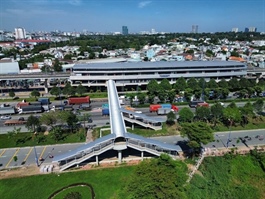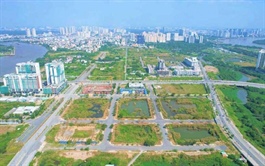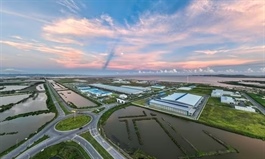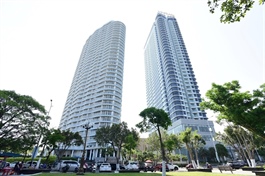Streamlined administration boosts Vietnam's hotel investment prospects
Streamlined administration boosts Vietnam's hotel investment prospects
According to the 2025 Vietnam Hotel Investment Guide, the country's hotel sector is drawing renewed investor interest as strong yields and rising visitor numbers point to a robust year-end outlook.
According to the guide, released on 21 November by global real estate services companyJLL and corporate law firm DN Legal, annual returns of 6–7.5 per cent are helping drive hotel investment, with total inflows expected to reach around $125 million by the end of 2025. Vietnam is consolidating its position as Southeast Asia’s fastest-growing tourism market, welcoming 13.9 million international visitors in the first eight months of the year – up 21.7 per cent on-year.
|
Karan Khanijou, senior vice president of Asia Hotel & Hospitality Investment at JLL, said his firm expects major deals to continue focusing on centrally located hotels and upscale resort projects in the coming years, driven by both domestic and international investors.
“Reflecting enhanced market fundamentals and active transaction pipelines, we have revised the 2025 transaction volume projection from $100 million to $125 million, incorporating both pending deals and improved investor confidence throughout the market,” Khanijou said.
The report notes that Vietnam’s hotel sector is gaining strong momentum thanks to new legal reforms. One major driver is the policy extending visa-free stays for selected nationalities from one month to three months and allowing unlimited entries since August 2023.
China remains the largest source market, with more than 3.5 million visitors, up 44.3 per cent on-year. South Korea contributed 2.9 million arrivals, while Taiwan recorded 829,000. India saw growth of more than 42 per cent, and European markets, particularly Russia, posted the strongest expansion during the period.
Hotel supply has increased steadily, achieving a compound annual growth rate of 7 per cent through 2024.
As of July, the market recorded over 185,000 rooms across more than 1,500 accommodation facilities, with the upscale-to-luxury segment accounting for 57 per cent of total supply.
Ho Chi Minh City, Hanoi, and Danang are the three key markets, representing 14 per cent, 13 per cent, and 12 per cent of national supply respectively.
Hanoi, Danang, and Hoi An lead future pipelines through 2028, with 33 per cent of upcoming supply expected in the mid-scale segment.
As of July, hotels nationwide continued to post robust performance with 20 per cent on-year growth, supported by rising occupancy.
Revenue per available room, measured in local currency, recorded average annual growth of 21 per cent from 2020 to 2024.
Ho Chi Minh City surpassed its 2019 performance levels in 2024 and has maintained strong momentum into 2025.
Along with Hanoi, the two cities significantly outperformed the national average thanks to their ability to attract a diverse mix of business, leisure, and events and conference travellers.
Hotel investment is also gaining attention, with recent transactions generating yields of 6 to 7.5 per cent, approaching investors’ target range of 8 to 9 per cent.
Vietnam is undergoing comprehensive legal reforms that are creating an unprecedentedly favourable investment environment.
The 2024 Land Law allows for more flexible land price adjustments within the same year instead of once every five years, improving transparency in land valuation.
Since July, the government has reduced construction permit requirements for projects with approved detailed plans or designs, eliminating major procedural impediments, shortening project timelines, and lowering costs and legal risks for investors. That month also saw a major administrative restructuring, merging 63 provinces and cities into 34 provincial-level units and consolidating several ministries to create a leaner governance system. This overhaul not only streamlines administration but also creates opportunities to upgrade transport networks, service standards, and accommodation infrastructure.
The Personal Data Protection Law, effective from January 2026, will require strict compliance with international standards for protecting customer and employee information, enhancing credibility while giving Vietnamese hotels a competitive edge.
The government is also rolling out initiatives to position Vietnam as a top tourism destination in Southeast Asia, including expanding international air connectivity and improving infrastructure.
Major airlines have widened their networks to additional Vietnamese destinations, such as Emirates, boosting accessibility for international travellers. Newly established Sun Phu Quoc Airlines also launched operations with the ambition of connecting domestic and international routes through Phu Quoc.
The combination of flexible visa policies, comprehensive legal reforms, and effective administrative restructuring is generating a sustainable growth cycle for Vietnam’s hotel sector.
Khanijou forecasts a positive outlook for 2026, with expectations for sustained deal activity contingent on quality hotel inventory entering the market.
“However, the greatest challenge remains identifying assets that meet institutional investment criteria, as the actual supply of such properties is still relatively limited,” he said.
- 19:13 21/11/2025





























